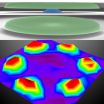(Press-News.org) November 17, 2014, PORTLAND, Ore. -- People who received automated reminders were more likely to refill their blood pressure and cholesterol medications, according to a study published today in a special issue of the American Journal of Managed Care.
The study, which included more than 21,000 Kaiser Permanente members, found that the average improvement in medication adherence was only about 2 percentage points, but the authors say that in a large population, even small changes can make a big difference.
"This small jump might not mean a lot to an individual patient, but on a population level it could translate into fewer heart attacks, fewer deaths and fewer hospitalizations, which will ultimately have an important impact on public health," said Bill Vollmer, PhD, lead author and senior investigator at the Kaiser Permanente Center for Health Research, in Portland.
In fact, Vollmer says that even though the study lasted only a year, patients who received both telephone and mailed reminders, saw improvements in their cholesterol levels that could lead to improved health outcomes if sustained.
According to a recent federal report, Americans with chronic conditions take their medications as prescribed about 50 to 60 percent of the time. The report estimates that this phenomenon, known as poor adherence, costs the health care system $100 billion to $300 billion each year, and results in about 125,000 deaths.
The most effective educational and behavioral interventions are often complex and costly, involving multiple components, so recently researchers have been testing less expensive health information technologies like automated calls and mailings.
Vollmer's study took place in 2010-2011 and enrolled 21,752 Kaiser Permanente members in Oregon, Washington, Georgia and Hawaii who had diabetes or heart disease and were taking medications to reduce the risk of a stroke or heart attack. Using Kaiser Permanente's electronic health record system, researchers identified patients who were either overdue or soon-to-be due to refill a prescription for a statin, ACE inhibitor or angiotensin receptor blocker.
The study, which examined the PROMPT reminder program, had three arms: usual care, an automated telephone call intervention, and an enhanced intervention that included reminder letters and live calls for those who didn't respond to the automated calls, as well as personalized health reports and educational mailings.
The interactive voice calls lasted about 2-3 minutes, reminding patients to refill their prescription and then giving them an option to be transferred to an automated refill line, or in some cases, to speak with a pharmacist.
At the beginning of the study, participants were taking their medications a little more than half the time. Adherence levels went up among all participants, but they increased by more (1.6-3.7 percentage points) among participants who received the reminders.
People in the enhanced intervention also saw significant reductions in their cholesterol levels. This effect was most pronounced for the subset of people who started out with levels above 100 mg/dl, which is considered uncontrolled. On average, this group had a 3.6 mg/dl greater reduction in cholesterol compared to people in the usual care group who started out with uncontrolled cholesterol, but received no calls or mailings.
Two Kaiser Permanente regions participating in the study are continuing the medication reminder program for patients who are behind on refilling their blood pressure and cholesterol medications.
The study authors are also conducting a cost analysis to examine whether the intervention is a good value for the money.
The study was funded by a CHOICE grant (RO1HS019341) from the Agency for HealthCare Research and Quality.
In another Kaiser Permanente study published in 2012, researchers found that automated reminders were very effective in boosting adherence for patients who had failed to promptly fill their first prescription for statins.
INFORMATION:
Authors include: William M. Vollmer, PhD, Reesa Laws, BS, David H. Smith, PhD, Amy Waterbury, MPH, and Jennifer L. Schneider, MPH, from the Kaiser Permanente Center for Health Research in Portland, Oregon; Ashli A. Owen-Smith, PhD and Suma Vupputuri, PhD, from Kaiser Permanente Georgia; Jeffrey O. Tom, MD, MS, Cyndee H. Yonehara, BS, and Andrew Williams, PhD, from the Kaiser Permanente Center for Health Research in Hawaii; Diane G. Ditmer, PharmD, from Kaiser Permanente Northwest, and Cynthia J. Rand, PhD, from Johns Hopkins University in Baltimore, Maryland.
About the Kaiser Permanente Center for Health Research
The Kaiser Permanente Center for Health Research, founded in 1964, is a nonprofit research institution dedicated to advancing knowledge to improve health. It has research sites in Portland, Ore., and Honolulu. http://www.kpchr.org
About Kaiser Permanente
Kaiser Permanente is committed to helping shape the future of health care. We are recognized as one of America's leading health care providers and not-for-profit health plans. Founded in 1945, our mission is to provide high-quality, affordable health care services and to improve the health of our members and the communities we serve. We currently serve approximately 9.5 million members in eight states and the District of Columbia. Care for members and patients is focused on their total health and guided by their personal physicians, specialists and team of caregivers. Our expert and caring medical teams are empowered and supported by industry-leading technology advances and tools for health promotion, disease prevention, state-of-the-art care delivery and world-class chronic disease management. Kaiser Permanente is dedicated to care innovations, clinical research, health education and the support of community health. For more information, go to: kp.org/share.
This news release is available in Spanish.
Although maize was originally domesticated in Mexico, the country's average yield per hectare is 38% below the world's average. In fact, Mexico imports 30% of its maize from foreign sources to keep up with internal demand.
To combat insect pests, Mexican farmers rely primarily on chemical insecticides. Approximately 3,000 tons of active ingredient are used each year just to manage the fall armyworm (Spodoptera frugiperda), in addition to even more chemicals used to control other pests such as the corn earworm (Helicoverpa ...
In the aquatic environment, suction feeding is far more common than biting as a way to capture prey. A new study shows that the evolution of biting behavior in eels led to a remarkable diversification of skull shapes, indicating that the skull shapes of most fish are limited by the structural requirements for suction feeding.
"When you look at the skulls of biters, the diversity is astounding compared to suction feeders," said Rita Mehta, assistant professor of ecology and evolutionary biology at UC Santa Cruz.
With more than 800 species, including both suction feeders ...
For the first time, scientists have vividly mapped the shapes and textures of high-order modes of Brownian motions--in this case, the collective macroscopic movement of molecules in microdisk resonators--researchers at Case Western Reserve University report.
To do this, they used a record-setting scanning optical interferometry technique, described in a study published today in the journal Nature Communications.
The new technology holds promise for multimodal sensing and signal processing, and to develop optical coding for computing and other information-processing ...
Chronic myeloid leukemia develops when a gene mutates and causes an enzyme to become hyperactive, causing blood-forming stem cells in the bone marrow to grow rapidly into abnormal cells. The enzyme, Abl-kinase, is a member of the "kinase" family of enzymes, which serve as an "on" or "off" switch for many functions in our cells. In chronic myeloid leukemia, the hyperactive Abl-kinase is targeted with drugs that bind to a specific part of the enzyme and block it, aiming to ultimately kill the fast-growing cancer cell. However, treatments are often limited by the fact that ...
One of the key reasons the Ebola outbreak got out of control in West Africa in the early days of the crisis was a lack of trust among community members, frontline health workers and the broader health system, suggests new Johns Hopkins Bloomberg School of Public Health research.
Had the citizens and their health care community developed a trusting relationship prior to the outbreak, important messages about the disease and how to stop its spread would likely have gotten through to people much sooner and slowed the march of Ebola, says Timothy Roberton, MPH, MA, a DrPH ...
People who frequently cook meals at home eat healthier and consume fewer calories than those who cook less, according to new Johns Hopkins Bloomberg School of Public Health research.
"When people cook most of their meals at home, they consume fewer carbohydrates, less sugar and less fat than those who cook less or not at all - even if they are not trying to lose weight," says Julia A. Wolfson, MPP, a CLF-Lerner Fellow at the Johns Hopkins Center for a Livable Future and lead author of the study.
The findings also suggest that those who frequently cooked at home - six-to-seven ...
You can offer young children healthier food choices in the elementary school cafeteria, but will they actually put it on their trays and eat it?
Probably not, suggests a new Johns Hopkins Bloomberg School of Public Health study.
Researchers observed 274 children in kindergarten through second grade in 10 New York City public schools as they selected from the offerings during one lunch period when a chicken-and-vegetable entrée was on the menu. They watched to see whether each of the six-through-eight-year-olds chose a fruit, vegetable, whole grain, low-fat milk ...
Black children are less likely to be diagnosed with and less likely to receive broad-spectrum antibiotics for ear infections than white children are, a new study has found. But the discrepancy in prescribing fewer broad-spectrum antibiotics means black children actually are more likely to receive care that aligns with the recommended guidelines for treating ear infections.
Two explanations for the observed disparities in care are overtreatment and overdiagnosis in white children, and undertreatment and underdiagnosis in black children. Addressing behaviors that contribute ...
PITTSBURGH, Nov. 17, 2014 - Commercially available datasets containing a wealth of information about food and alcohol establishments differ significantly, raising concerns about their reliability as sources of information that could be used to set public policy or conduct scientific research, according to a University of Pittsburgh Graduate School of Public Health investigation.
The analysis, funded by the Aetna Foundation, will be presented Monday at the American Public Health Association's (APHA) annual meeting in New Orleans. It examined systematic differences in two ...
Organs can become significantly damaged during transplantation, but a new article published in the BJS (British Journal of Surgery) offers a protective strategy that could keep them safe and allow them to function optimally after the procedure.
When an organ is transplanted from a donor to a recipient, there is a period of time when the organ is deprived of normal blood flow. While this in itself can cause tissue damage, additional damage may also occur when blood flow is restored to the organ due to a high risk of blood clotting.
Investigators led by Thierry Hauet, ...


